Reflective Learning: Improving Assessments with Gibbs Model
VerifiedAdded on 2023/06/16
|7
|1823
|484
Report
AI Summary
This report delves into the significance of reflection and reflective approaches in higher education, emphasizing their role in connecting past and future learning experiences. It highlights the Gibbs Model as a tool for self-assessment and improvement, facilitating a deeper understanding of personal strengths and weaknesses. The report further explores how feedback and feed-forward mechanisms can enhance learning outcomes and improve performance in both formative and summative assessments. It underscores the importance of continuous self-evaluation, problem-solving, and collaborative learning environments in fostering academic success. The document concludes by emphasizing the practical benefits of reflective practices in promoting student confidence, self-awareness, and enthusiasm for lifelong learning.
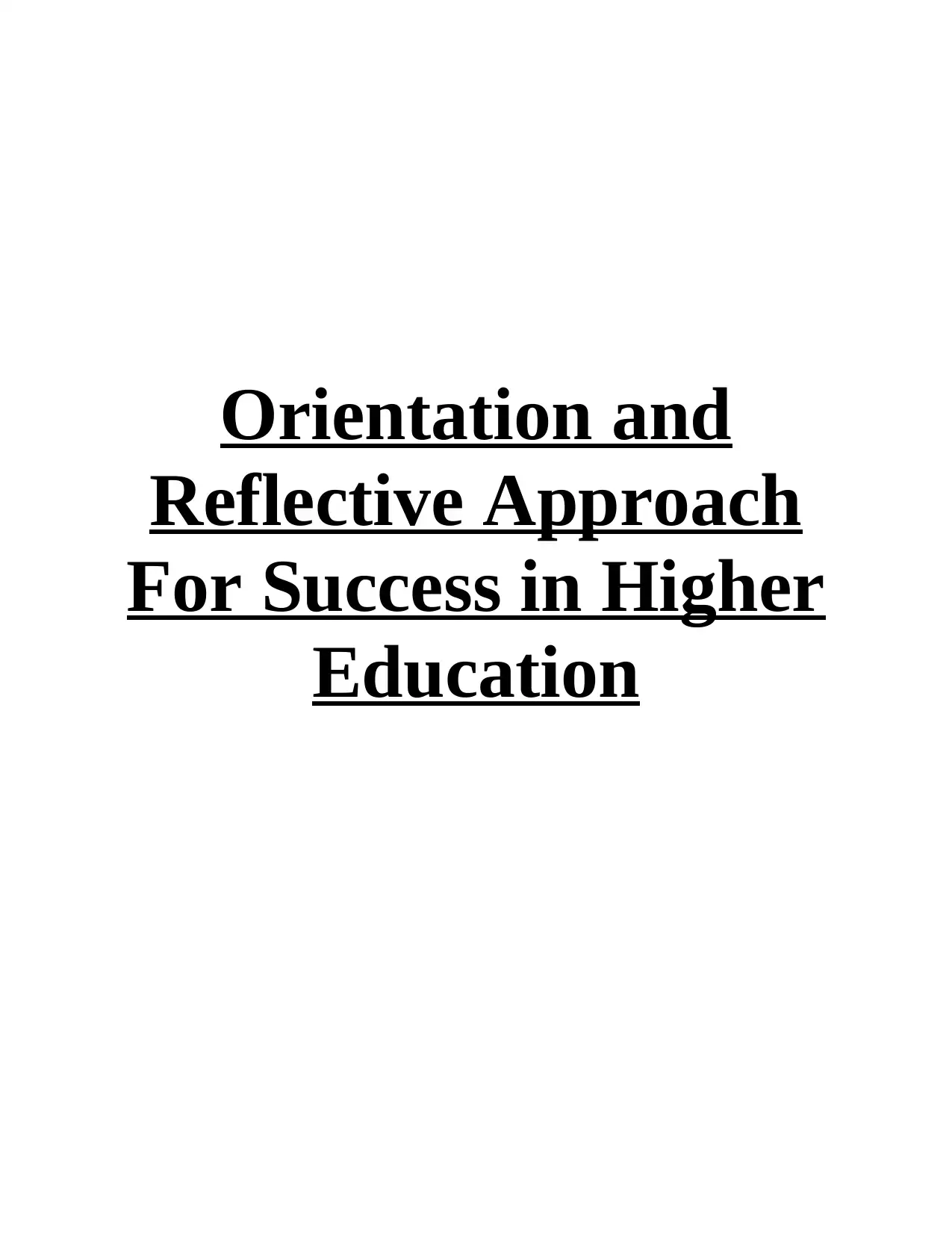
Orientation and
Reflective Approach
For Success in Higher
Education
Reflective Approach
For Success in Higher
Education
Paraphrase This Document
Need a fresh take? Get an instant paraphrase of this document with our AI Paraphraser
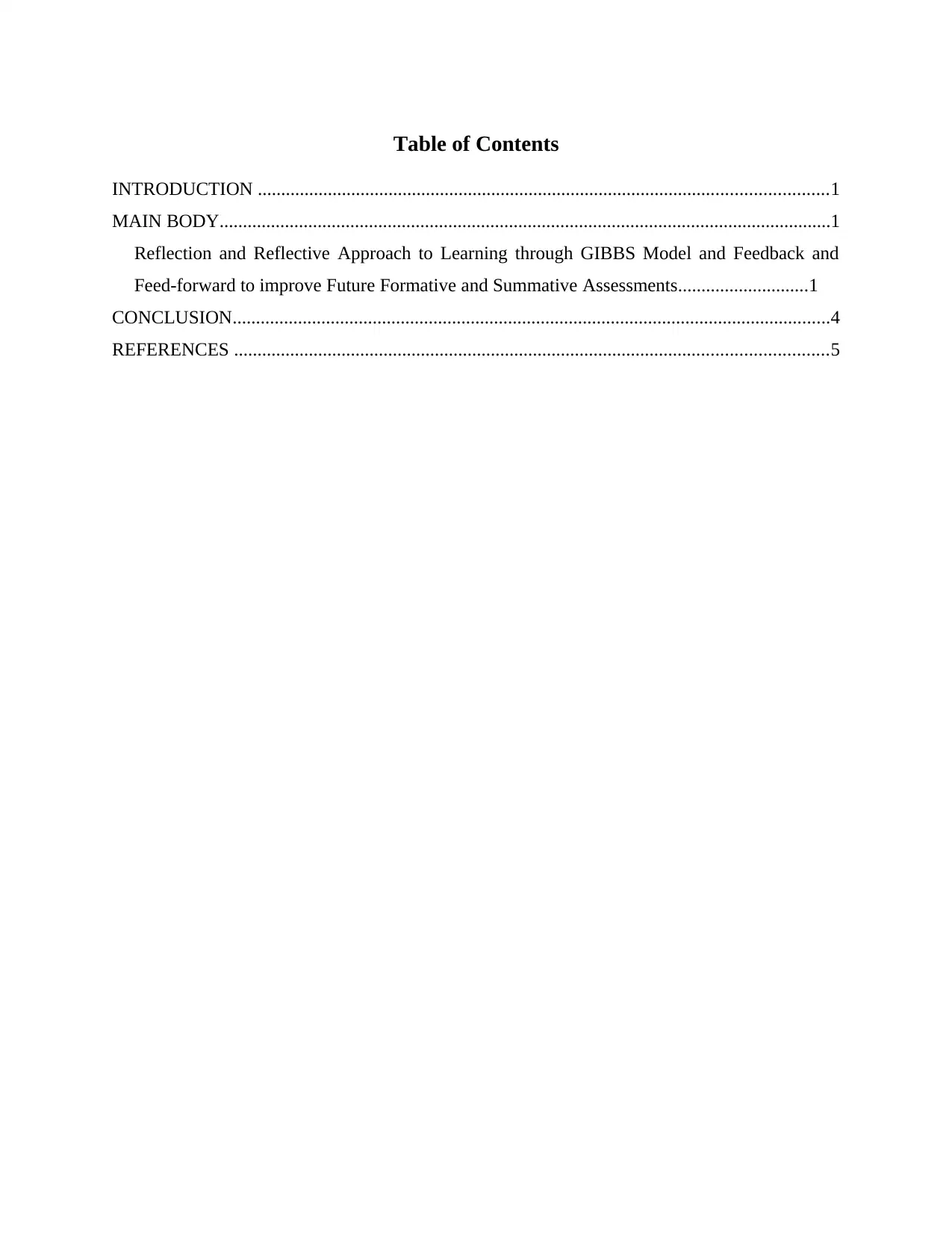
Table of Contents
INTRODUCTION ..........................................................................................................................1
MAIN BODY...................................................................................................................................1
Reflection and Reflective Approach to Learning through GIBBS Model and Feedback and
Feed-forward to improve Future Formative and Summative Assessments............................1
CONCLUSION................................................................................................................................4
REFERENCES ...............................................................................................................................5
INTRODUCTION ..........................................................................................................................1
MAIN BODY...................................................................................................................................1
Reflection and Reflective Approach to Learning through GIBBS Model and Feedback and
Feed-forward to improve Future Formative and Summative Assessments............................1
CONCLUSION................................................................................................................................4
REFERENCES ...............................................................................................................................5
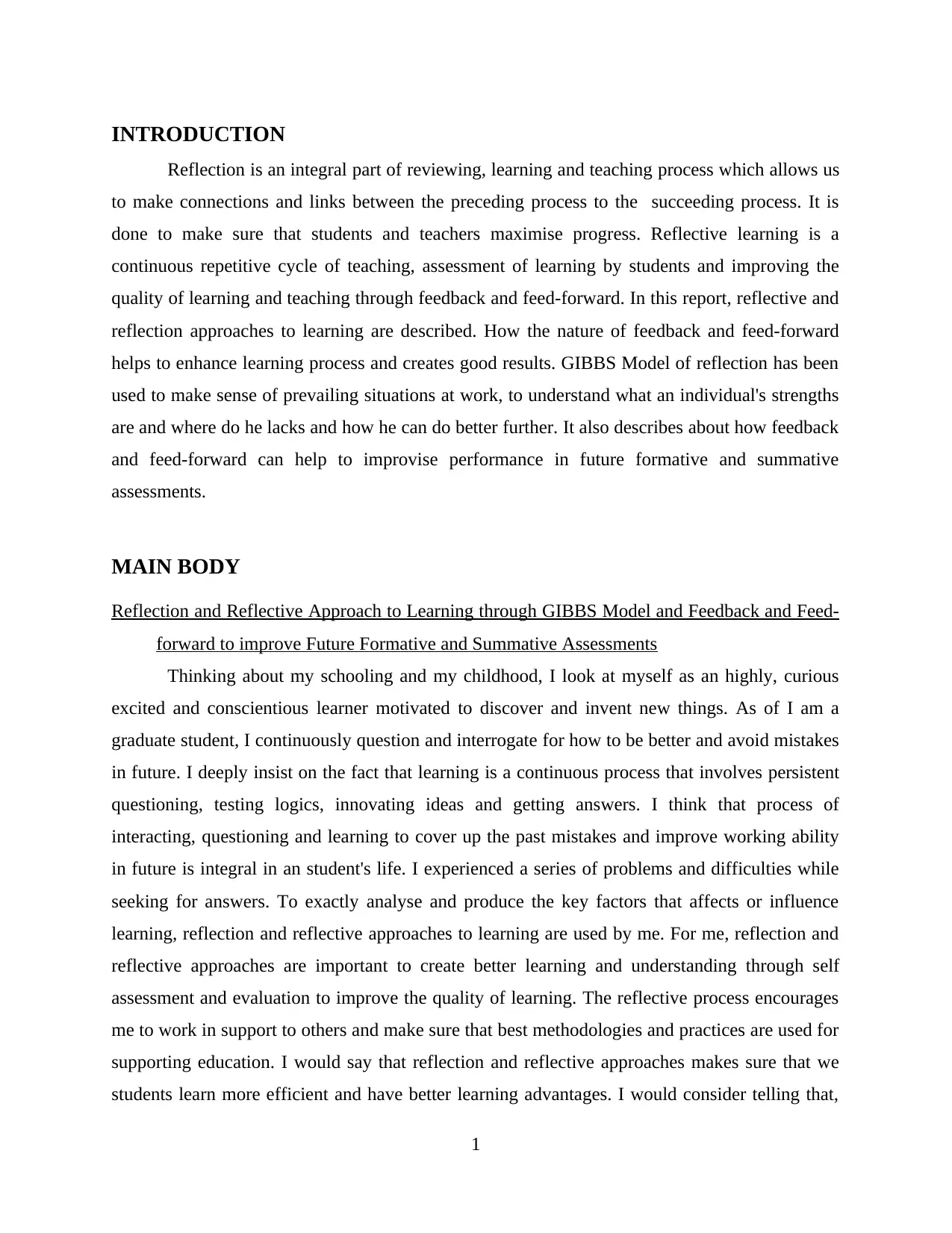
INTRODUCTION
Reflection is an integral part of reviewing, learning and teaching process which allows us
to make connections and links between the preceding process to the succeeding process. It is
done to make sure that students and teachers maximise progress. Reflective learning is a
continuous repetitive cycle of teaching, assessment of learning by students and improving the
quality of learning and teaching through feedback and feed-forward. In this report, reflective and
reflection approaches to learning are described. How the nature of feedback and feed-forward
helps to enhance learning process and creates good results. GIBBS Model of reflection has been
used to make sense of prevailing situations at work, to understand what an individual's strengths
are and where do he lacks and how he can do better further. It also describes about how feedback
and feed-forward can help to improvise performance in future formative and summative
assessments.
MAIN BODY
Reflection and Reflective Approach to Learning through GIBBS Model and Feedback and Feed-
forward to improve Future Formative and Summative Assessments
Thinking about my schooling and my childhood, I look at myself as an highly, curious
excited and conscientious learner motivated to discover and invent new things. As of I am a
graduate student, I continuously question and interrogate for how to be better and avoid mistakes
in future. I deeply insist on the fact that learning is a continuous process that involves persistent
questioning, testing logics, innovating ideas and getting answers. I think that process of
interacting, questioning and learning to cover up the past mistakes and improve working ability
in future is integral in an student's life. I experienced a series of problems and difficulties while
seeking for answers. To exactly analyse and produce the key factors that affects or influence
learning, reflection and reflective approaches to learning are used by me. For me, reflection and
reflective approaches are important to create better learning and understanding through self
assessment and evaluation to improve the quality of learning. The reflective process encourages
me to work in support to others and make sure that best methodologies and practices are used for
supporting education. I would say that reflection and reflective approaches makes sure that we
students learn more efficient and have better learning advantages. I would consider telling that,
1
Reflection is an integral part of reviewing, learning and teaching process which allows us
to make connections and links between the preceding process to the succeeding process. It is
done to make sure that students and teachers maximise progress. Reflective learning is a
continuous repetitive cycle of teaching, assessment of learning by students and improving the
quality of learning and teaching through feedback and feed-forward. In this report, reflective and
reflection approaches to learning are described. How the nature of feedback and feed-forward
helps to enhance learning process and creates good results. GIBBS Model of reflection has been
used to make sense of prevailing situations at work, to understand what an individual's strengths
are and where do he lacks and how he can do better further. It also describes about how feedback
and feed-forward can help to improvise performance in future formative and summative
assessments.
MAIN BODY
Reflection and Reflective Approach to Learning through GIBBS Model and Feedback and Feed-
forward to improve Future Formative and Summative Assessments
Thinking about my schooling and my childhood, I look at myself as an highly, curious
excited and conscientious learner motivated to discover and invent new things. As of I am a
graduate student, I continuously question and interrogate for how to be better and avoid mistakes
in future. I deeply insist on the fact that learning is a continuous process that involves persistent
questioning, testing logics, innovating ideas and getting answers. I think that process of
interacting, questioning and learning to cover up the past mistakes and improve working ability
in future is integral in an student's life. I experienced a series of problems and difficulties while
seeking for answers. To exactly analyse and produce the key factors that affects or influence
learning, reflection and reflective approaches to learning are used by me. For me, reflection and
reflective approaches are important to create better learning and understanding through self
assessment and evaluation to improve the quality of learning. The reflective process encourages
me to work in support to others and make sure that best methodologies and practices are used for
supporting education. I would say that reflection and reflective approaches makes sure that we
students learn more efficient and have better learning advantages. I would consider telling that,
1
⊘ This is a preview!⊘
Do you want full access?
Subscribe today to unlock all pages.

Trusted by 1+ million students worldwide
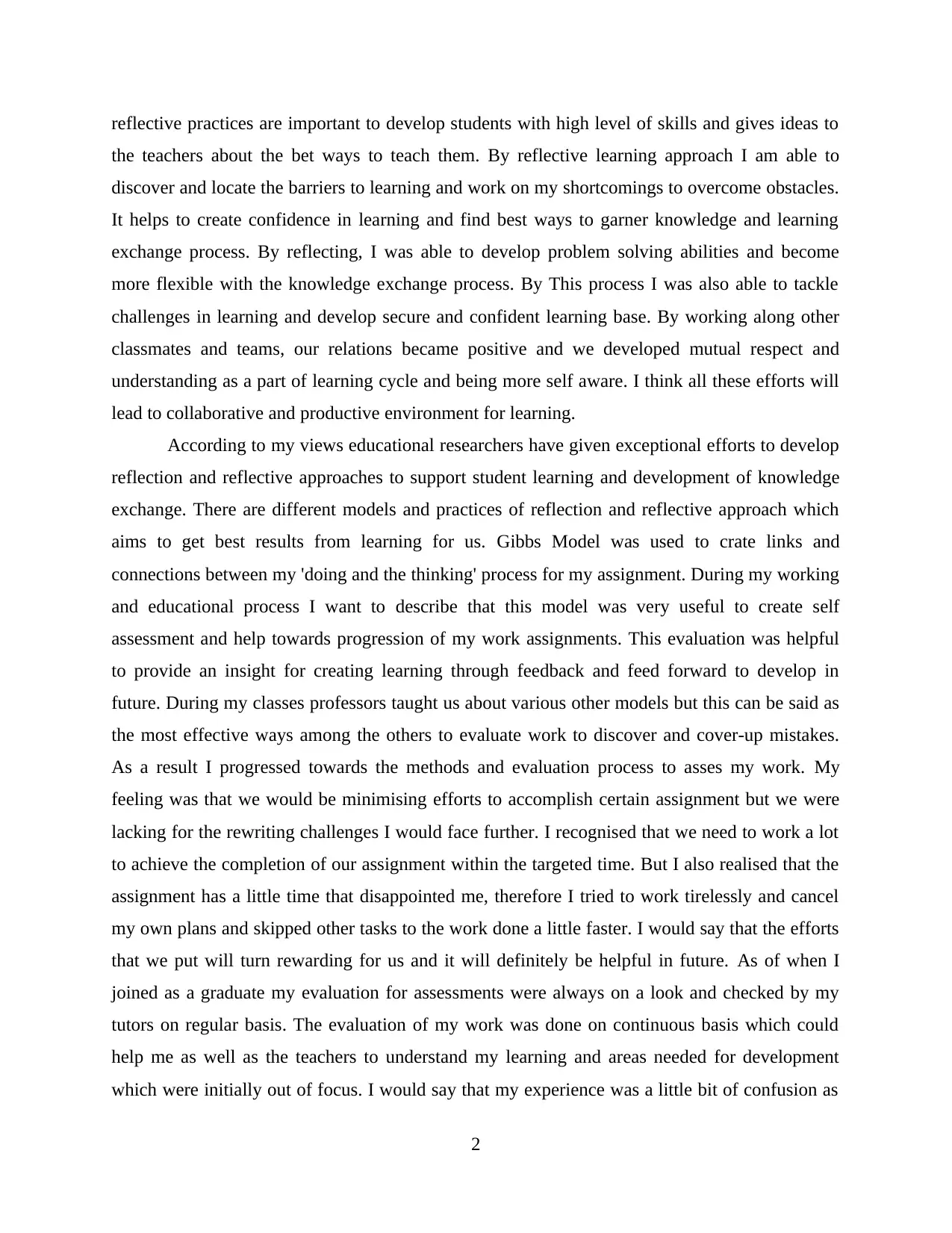
reflective practices are important to develop students with high level of skills and gives ideas to
the teachers about the bet ways to teach them. By reflective learning approach I am able to
discover and locate the barriers to learning and work on my shortcomings to overcome obstacles.
It helps to create confidence in learning and find best ways to garner knowledge and learning
exchange process. By reflecting, I was able to develop problem solving abilities and become
more flexible with the knowledge exchange process. By This process I was also able to tackle
challenges in learning and develop secure and confident learning base. By working along other
classmates and teams, our relations became positive and we developed mutual respect and
understanding as a part of learning cycle and being more self aware. I think all these efforts will
lead to collaborative and productive environment for learning.
According to my views educational researchers have given exceptional efforts to develop
reflection and reflective approaches to support student learning and development of knowledge
exchange. There are different models and practices of reflection and reflective approach which
aims to get best results from learning for us. Gibbs Model was used to crate links and
connections between my 'doing and the thinking' process for my assignment. During my working
and educational process I want to describe that this model was very useful to create self
assessment and help towards progression of my work assignments. This evaluation was helpful
to provide an insight for creating learning through feedback and feed forward to develop in
future. During my classes professors taught us about various other models but this can be said as
the most effective ways among the others to evaluate work to discover and cover-up mistakes.
As a result I progressed towards the methods and evaluation process to asses my work. My
feeling was that we would be minimising efforts to accomplish certain assignment but we were
lacking for the rewriting challenges I would face further. I recognised that we need to work a lot
to achieve the completion of our assignment within the targeted time. But I also realised that the
assignment has a little time that disappointed me, therefore I tried to work tirelessly and cancel
my own plans and skipped other tasks to the work done a little faster. I would say that the efforts
that we put will turn rewarding for us and it will definitely be helpful in future. As of when I
joined as a graduate my evaluation for assessments were always on a look and checked by my
tutors on regular basis. The evaluation of my work was done on continuous basis which could
help me as well as the teachers to understand my learning and areas needed for development
which were initially out of focus. I would say that my experience was a little bit of confusion as
2
the teachers about the bet ways to teach them. By reflective learning approach I am able to
discover and locate the barriers to learning and work on my shortcomings to overcome obstacles.
It helps to create confidence in learning and find best ways to garner knowledge and learning
exchange process. By reflecting, I was able to develop problem solving abilities and become
more flexible with the knowledge exchange process. By This process I was also able to tackle
challenges in learning and develop secure and confident learning base. By working along other
classmates and teams, our relations became positive and we developed mutual respect and
understanding as a part of learning cycle and being more self aware. I think all these efforts will
lead to collaborative and productive environment for learning.
According to my views educational researchers have given exceptional efforts to develop
reflection and reflective approaches to support student learning and development of knowledge
exchange. There are different models and practices of reflection and reflective approach which
aims to get best results from learning for us. Gibbs Model was used to crate links and
connections between my 'doing and the thinking' process for my assignment. During my working
and educational process I want to describe that this model was very useful to create self
assessment and help towards progression of my work assignments. This evaluation was helpful
to provide an insight for creating learning through feedback and feed forward to develop in
future. During my classes professors taught us about various other models but this can be said as
the most effective ways among the others to evaluate work to discover and cover-up mistakes.
As a result I progressed towards the methods and evaluation process to asses my work. My
feeling was that we would be minimising efforts to accomplish certain assignment but we were
lacking for the rewriting challenges I would face further. I recognised that we need to work a lot
to achieve the completion of our assignment within the targeted time. But I also realised that the
assignment has a little time that disappointed me, therefore I tried to work tirelessly and cancel
my own plans and skipped other tasks to the work done a little faster. I would say that the efforts
that we put will turn rewarding for us and it will definitely be helpful in future. As of when I
joined as a graduate my evaluation for assessments were always on a look and checked by my
tutors on regular basis. The evaluation of my work was done on continuous basis which could
help me as well as the teachers to understand my learning and areas needed for development
which were initially out of focus. I would say that my experience was a little bit of confusion as
2
Paraphrase This Document
Need a fresh take? Get an instant paraphrase of this document with our AI Paraphraser
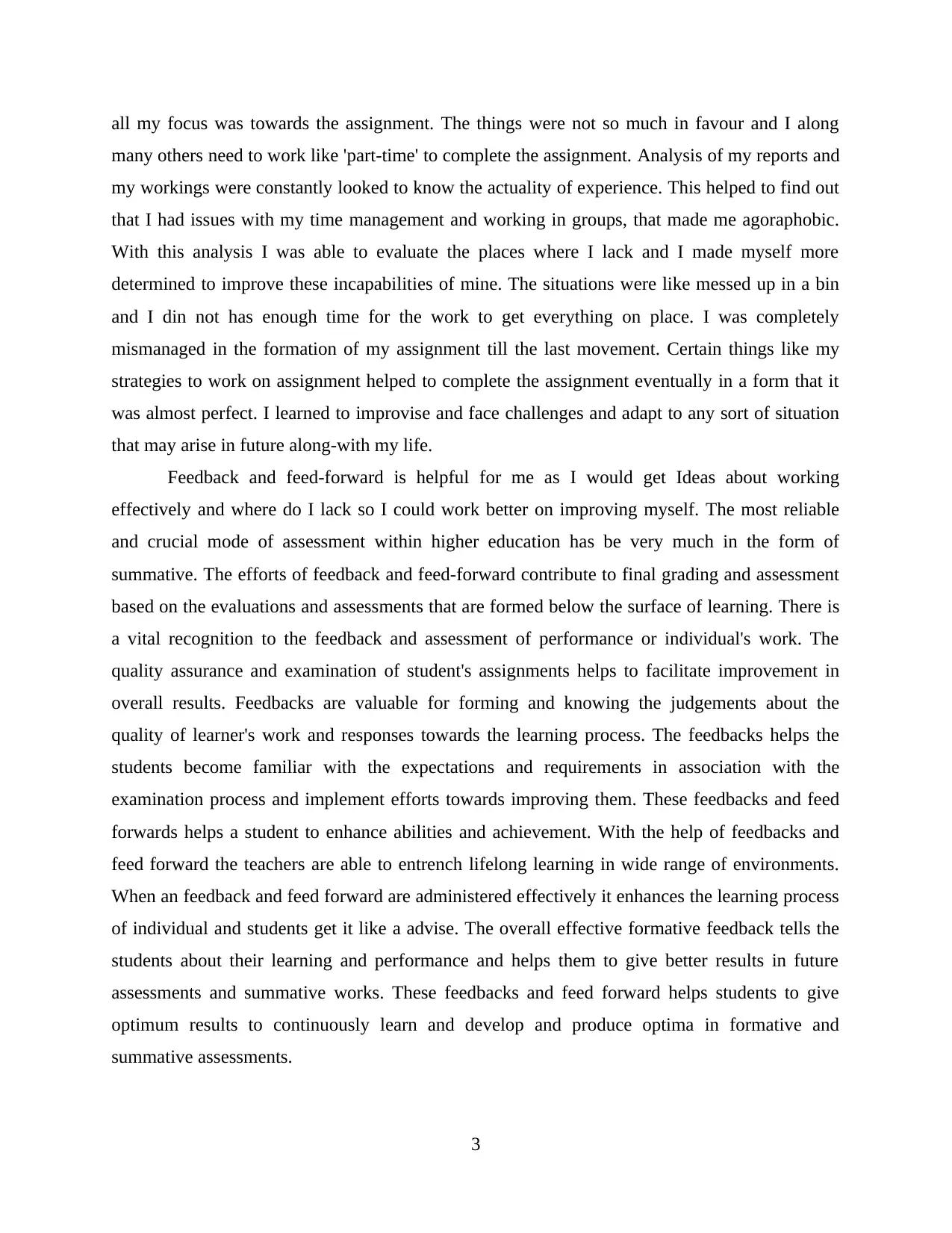
all my focus was towards the assignment. The things were not so much in favour and I along
many others need to work like 'part-time' to complete the assignment. Analysis of my reports and
my workings were constantly looked to know the actuality of experience. This helped to find out
that I had issues with my time management and working in groups, that made me agoraphobic.
With this analysis I was able to evaluate the places where I lack and I made myself more
determined to improve these incapabilities of mine. The situations were like messed up in a bin
and I din not has enough time for the work to get everything on place. I was completely
mismanaged in the formation of my assignment till the last movement. Certain things like my
strategies to work on assignment helped to complete the assignment eventually in a form that it
was almost perfect. I learned to improvise and face challenges and adapt to any sort of situation
that may arise in future along-with my life.
Feedback and feed-forward is helpful for me as I would get Ideas about working
effectively and where do I lack so I could work better on improving myself. The most reliable
and crucial mode of assessment within higher education has be very much in the form of
summative. The efforts of feedback and feed-forward contribute to final grading and assessment
based on the evaluations and assessments that are formed below the surface of learning. There is
a vital recognition to the feedback and assessment of performance or individual's work. The
quality assurance and examination of student's assignments helps to facilitate improvement in
overall results. Feedbacks are valuable for forming and knowing the judgements about the
quality of learner's work and responses towards the learning process. The feedbacks helps the
students become familiar with the expectations and requirements in association with the
examination process and implement efforts towards improving them. These feedbacks and feed
forwards helps a student to enhance abilities and achievement. With the help of feedbacks and
feed forward the teachers are able to entrench lifelong learning in wide range of environments.
When an feedback and feed forward are administered effectively it enhances the learning process
of individual and students get it like a advise. The overall effective formative feedback tells the
students about their learning and performance and helps them to give better results in future
assessments and summative works. These feedbacks and feed forward helps students to give
optimum results to continuously learn and develop and produce optima in formative and
summative assessments.
3
many others need to work like 'part-time' to complete the assignment. Analysis of my reports and
my workings were constantly looked to know the actuality of experience. This helped to find out
that I had issues with my time management and working in groups, that made me agoraphobic.
With this analysis I was able to evaluate the places where I lack and I made myself more
determined to improve these incapabilities of mine. The situations were like messed up in a bin
and I din not has enough time for the work to get everything on place. I was completely
mismanaged in the formation of my assignment till the last movement. Certain things like my
strategies to work on assignment helped to complete the assignment eventually in a form that it
was almost perfect. I learned to improvise and face challenges and adapt to any sort of situation
that may arise in future along-with my life.
Feedback and feed-forward is helpful for me as I would get Ideas about working
effectively and where do I lack so I could work better on improving myself. The most reliable
and crucial mode of assessment within higher education has be very much in the form of
summative. The efforts of feedback and feed-forward contribute to final grading and assessment
based on the evaluations and assessments that are formed below the surface of learning. There is
a vital recognition to the feedback and assessment of performance or individual's work. The
quality assurance and examination of student's assignments helps to facilitate improvement in
overall results. Feedbacks are valuable for forming and knowing the judgements about the
quality of learner's work and responses towards the learning process. The feedbacks helps the
students become familiar with the expectations and requirements in association with the
examination process and implement efforts towards improving them. These feedbacks and feed
forwards helps a student to enhance abilities and achievement. With the help of feedbacks and
feed forward the teachers are able to entrench lifelong learning in wide range of environments.
When an feedback and feed forward are administered effectively it enhances the learning process
of individual and students get it like a advise. The overall effective formative feedback tells the
students about their learning and performance and helps them to give better results in future
assessments and summative works. These feedbacks and feed forward helps students to give
optimum results to continuously learn and develop and produce optima in formative and
summative assessments.
3
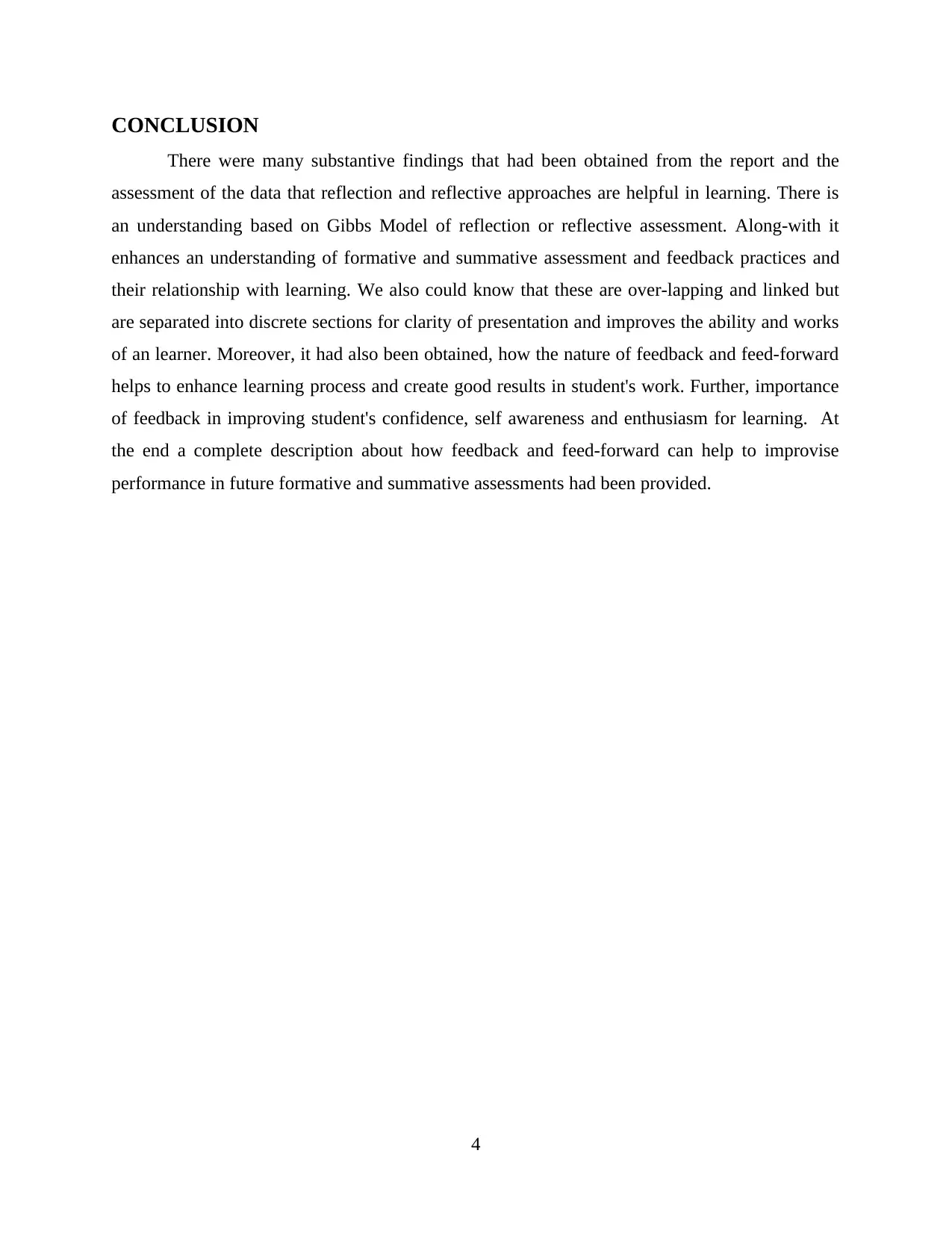
CONCLUSION
There were many substantive findings that had been obtained from the report and the
assessment of the data that reflection and reflective approaches are helpful in learning. There is
an understanding based on Gibbs Model of reflection or reflective assessment. Along-with it
enhances an understanding of formative and summative assessment and feedback practices and
their relationship with learning. We also could know that these are over-lapping and linked but
are separated into discrete sections for clarity of presentation and improves the ability and works
of an learner. Moreover, it had also been obtained, how the nature of feedback and feed-forward
helps to enhance learning process and create good results in student's work. Further, importance
of feedback in improving student's confidence, self awareness and enthusiasm for learning. At
the end a complete description about how feedback and feed-forward can help to improvise
performance in future formative and summative assessments had been provided.
4
There were many substantive findings that had been obtained from the report and the
assessment of the data that reflection and reflective approaches are helpful in learning. There is
an understanding based on Gibbs Model of reflection or reflective assessment. Along-with it
enhances an understanding of formative and summative assessment and feedback practices and
their relationship with learning. We also could know that these are over-lapping and linked but
are separated into discrete sections for clarity of presentation and improves the ability and works
of an learner. Moreover, it had also been obtained, how the nature of feedback and feed-forward
helps to enhance learning process and create good results in student's work. Further, importance
of feedback in improving student's confidence, self awareness and enthusiasm for learning. At
the end a complete description about how feedback and feed-forward can help to improvise
performance in future formative and summative assessments had been provided.
4
⊘ This is a preview!⊘
Do you want full access?
Subscribe today to unlock all pages.

Trusted by 1+ million students worldwide
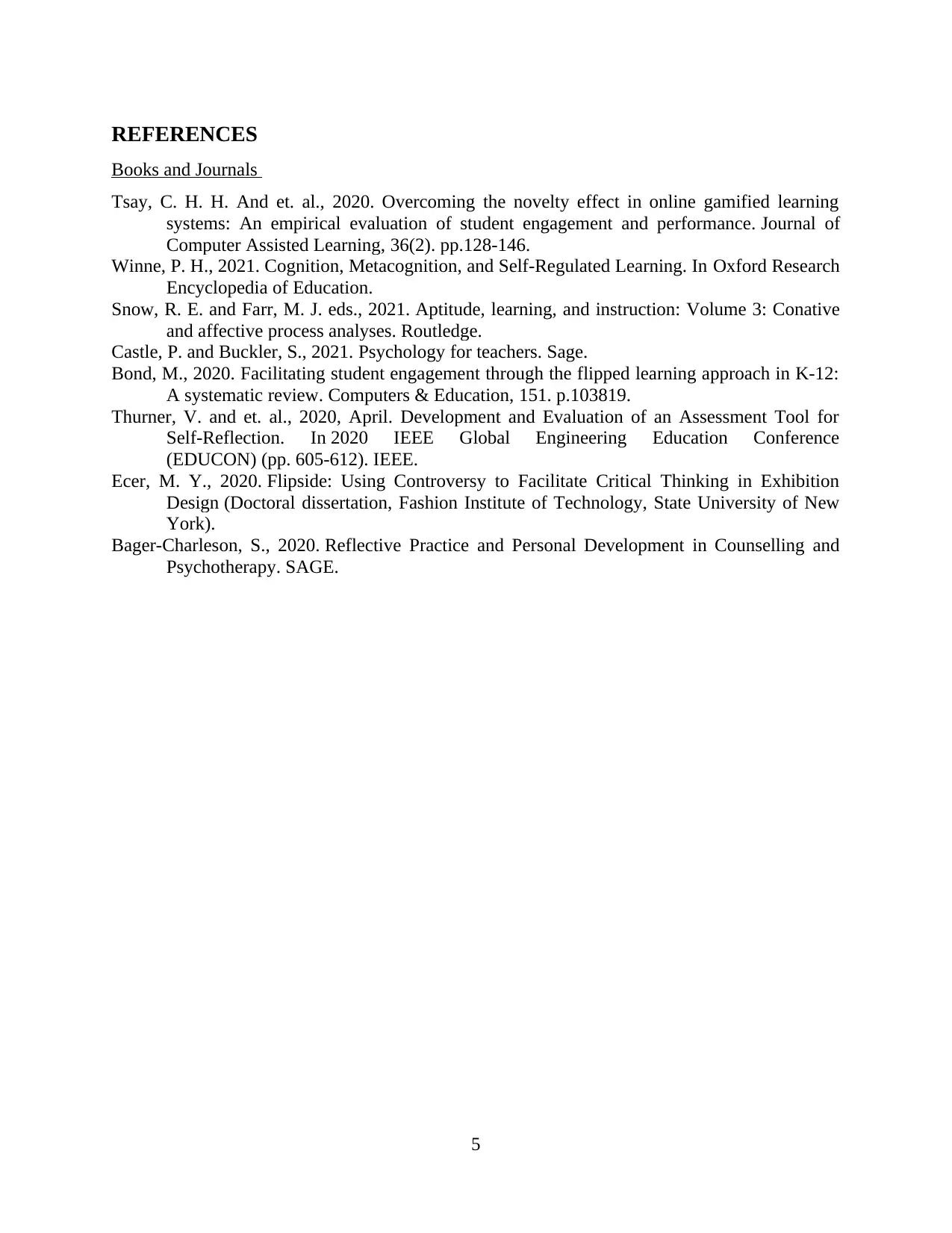
REFERENCES
Books and Journals
Tsay, C. H. H. And et. al., 2020. Overcoming the novelty effect in online gamified learning
systems: An empirical evaluation of student engagement and performance. Journal of
Computer Assisted Learning, 36(2). pp.128-146.
Winne, P. H., 2021. Cognition, Metacognition, and Self-Regulated Learning. In Oxford Research
Encyclopedia of Education.
Snow, R. E. and Farr, M. J. eds., 2021. Aptitude, learning, and instruction: Volume 3: Conative
and affective process analyses. Routledge.
Castle, P. and Buckler, S., 2021. Psychology for teachers. Sage.
Bond, M., 2020. Facilitating student engagement through the flipped learning approach in K-12:
A systematic review. Computers & Education, 151. p.103819.
Thurner, V. and et. al., 2020, April. Development and Evaluation of an Assessment Tool for
Self-Reflection. In 2020 IEEE Global Engineering Education Conference
(EDUCON) (pp. 605-612). IEEE.
Ecer, M. Y., 2020. Flipside: Using Controversy to Facilitate Critical Thinking in Exhibition
Design (Doctoral dissertation, Fashion Institute of Technology, State University of New
York).
Bager-Charleson, S., 2020. Reflective Practice and Personal Development in Counselling and
Psychotherapy. SAGE.
5
Books and Journals
Tsay, C. H. H. And et. al., 2020. Overcoming the novelty effect in online gamified learning
systems: An empirical evaluation of student engagement and performance. Journal of
Computer Assisted Learning, 36(2). pp.128-146.
Winne, P. H., 2021. Cognition, Metacognition, and Self-Regulated Learning. In Oxford Research
Encyclopedia of Education.
Snow, R. E. and Farr, M. J. eds., 2021. Aptitude, learning, and instruction: Volume 3: Conative
and affective process analyses. Routledge.
Castle, P. and Buckler, S., 2021. Psychology for teachers. Sage.
Bond, M., 2020. Facilitating student engagement through the flipped learning approach in K-12:
A systematic review. Computers & Education, 151. p.103819.
Thurner, V. and et. al., 2020, April. Development and Evaluation of an Assessment Tool for
Self-Reflection. In 2020 IEEE Global Engineering Education Conference
(EDUCON) (pp. 605-612). IEEE.
Ecer, M. Y., 2020. Flipside: Using Controversy to Facilitate Critical Thinking in Exhibition
Design (Doctoral dissertation, Fashion Institute of Technology, State University of New
York).
Bager-Charleson, S., 2020. Reflective Practice and Personal Development in Counselling and
Psychotherapy. SAGE.
5
1 out of 7
Related Documents
Your All-in-One AI-Powered Toolkit for Academic Success.
+13062052269
info@desklib.com
Available 24*7 on WhatsApp / Email
![[object Object]](/_next/static/media/star-bottom.7253800d.svg)
Unlock your academic potential
Copyright © 2020–2026 A2Z Services. All Rights Reserved. Developed and managed by ZUCOL.



